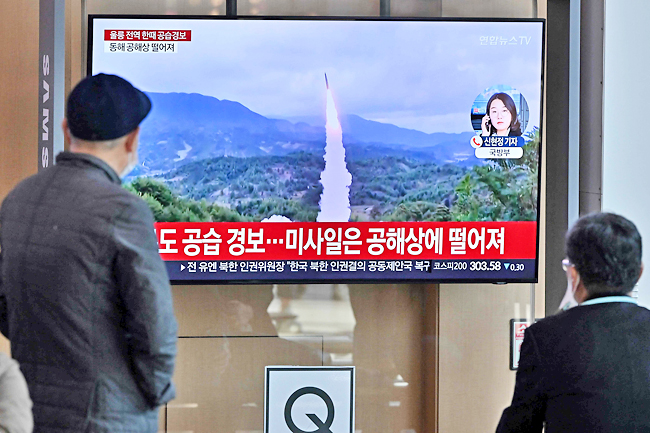SEOUL (AFP) – North Korea fired more than 20 missiles yesterday, including one that landed close to South Korea’s waters in what President Yoon Suk-yeol said was “effectively a territorial invasion”.
It also fired an artillery barrage into a maritime “buffer zone”, which experts said was part of an “aggressive and threatening” response by Pyongyang to large-scale joint air drills the United States (US) and South Korea are currently conducting.
One short-range ballistic missile crossed the Northern Limit Line, the de facto maritime border, prompting a rare warning for residents on the island of Ulleungdo to seek shelter in bunkers.
Seoul’s military said it was the “first time since the peninsula was divided” at the end of Korean War hostilities in 1953 that a North Korean missile had landed so close to the South’s territorial waters.
“President Yoon pointed out today that North Korea’s provocation is an effective territorial invasion by a missile,” his office said in a statement.

One of the missiles landed in waters just 57 kilometres east of the mainland, the military said, calling the incident “very rare and intolerable”.
Pyongyang fired a total of 23 missiles including seven short-range ballistic missiles and six ground-to-air ones, Seoul’s military said.
North Korea also conducted an artillery barrage, firing into a maritime “buffer-zone” set up in 2018 in a bid to reduce tensions between the two countries during an ill-fated bout of diplomacy.
The huge volley of launches were “provocations against South Korea”, said researcher at the Asan Institute for Policy Studies Go Myong-hyun.
“I wouldn’t be surprised if they lead up to a nuclear test,” he added.
South Korea, for its part, said it had fired three air-to-ground missiles into the sea towards the north of the two countries’ maritime boundary.
President Yoon called a meeting of the National Security Council, ordering “swift and stern measures so that North Korea’s provocations pay a clear price”.
South Korea closed some air routes over the East Sea, also known as the Sea of Japan, advising local airlines to detour to “ensure passenger safety in the routes to the US and Japan”.
Russia called for calm, with a Kremlin spokesman saying all parties “should avoid taking any steps that could provoke a further increase in tensions”.
Pyongyang’s day of repeated missile launches came as Seoul and Washington staged their largest-ever joint air drills, dubbed “Vigilant Storm”, involving hundreds of warplanes from both sides.
High-ranking North Korean official Pak Jong-chon, had earlier called the drills aggressive and provocative, according to a report in state media yesterday.
Pak said the name of the exercises harked back to Operation Desert Storm, the US-led military assault on Iraq in 1990-1991 after the invasion of Kuwait.
North Korea’s missile launches yesterday appeared to be “the most aggressive and threatening armed demonstration against the South since 2010”, researcher at the Sejong Institute Cheong Seong-chang told AFP. “It is now a dangerous and unstable situation that could lead to armed conflict.”





